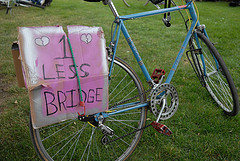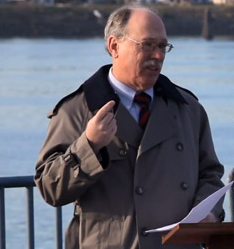Last month the Portland mega-highway bridge project known as the Columbia River Crossing died unceremoniously on the floor of the Washington statehouse. But there was some question among project opponents about whether to consider it a victory for smart transportation policy. After all, suburban Republicans opposed to the inclusion of light rail were ultimately the straw that broke the camel's back.

Joe Cortright, a visiting scholar with the Brookings Institution and president at Impresa, a Portland-based consulting firm, thinks there is plenty of reason to celebrate. In fact, he sees the rejection of the CRC as the end of the old highway era.
We caught Cortright on the phone for a CRC postmortem. Here's what he had to say.
Angie Schmitt: So you still consider the CRC's death a victory for reformers. Why is that?
Joe Cortright: The CRC was a five-mile long, 12-lane wide freeway widening project that just happened to cross a river and have a short stub of a light rail essentially on the end of it. So yeah, there was a little bit of light rail associated with this project, but it was wrapped up in a humongous freeway widening project. And also the fact that they're building this huge freeway project really undercut the viability of the light rail investment, because it made it so easy for people to use private automobiles.
I think it's true that the final fatal blow was struck by conservatives, by Republicans, in Washington, and folks from Clark County, a lot of them disliked the light rail component of the project. But they also disliked it for other reasons like the tolling. The project was probably mortally wounded some time ago and this just happened to be the one thing that finally killed it. And a lot of those wounds were self-inflicted. They built it too short to allow navigation [on the river] underneath. There's pending litigation on the environmental impact statement. There's still very serious questions about the financial viability of the project. So there were a bunch of things that could have been the fatal blow, it just happened that this was the one.
AS: One of the things that was sort of striking about this project was just the scale and the dollar figure attached to it (at least $3.2 billion). Do you think it's getting to the point where some of these projects are just so grandiose they're not realistic?
JC: Absolutely. I think the big problem is that the incentives in the transportation planning system are producing these bloated projects that are really out of touch with trends in transportation, with the amount of resources we have. People are driving less and that undercuts gas taxes, which are the largest single source of funding for this. The way federal funding was made available, or potentially made available, for this project created incentives to scale it up. I don't think anyone would have designed a project like this if it was going to be built solely with local resources. They designed it this way because they thought there was a promise, if they got approval from the state, the federal government would pay for it. We sold this project as, "Hey, we can get free federal money for light rail."
AS: You said you thought this project sort of symbolized the end of the highway era. Can you elaborate on that?
JC: I think [it's the end of] the highway-building dinosaur era. Again, this was a 12-lane wide freeway, is what they were talking about. More than half the money in this project would have gone to rebuilding freeway interchanges and widening the freeway. It was justified with a set of traffic projections that were done on a 2005 base year, using data from the 1990s and a model that said everybody was going to drive more every year. And we know that's not true, in fact people are driving less. The slowdown started a decade ago, more than a decade ago.
Essentially they had a worldview that we need to accommodate more and more cars. I really think it was a project that was designed for a future that nobody's going to live in. The models were predicated basically on dollar-a-gallon gas forever.
AS: What does the death of the CRC mean for sustainable transportation in Portland and elsewhere?
JC: This is a watershed moment to revisit some of the thinking about the way we approach transportation planning. We have to have very different views of what transportation looks like in the future and recognize that views are changing. We have to have much more of a small ball approach to transportation. Hopefully this is just a chance to rethink transportation investment and policy in our era.






